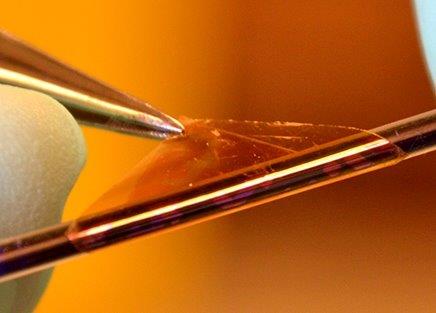FOR IMMEDIATE RELEASE
ACS News Service Weekly PressPac: September 24, 2014
‘Greener,’ low-cost transistor heralds advance in flexible electronics
As tech company LG demonstrated this summer with the unveiling of its 18-inch flexible screen, the next generation of roll-up displays is tantalizingly close. Researchers are now reporting in the journal ACS Nano a new, inexpensive and simple way to make transparent, flexible transistors — the building blocks of electronics — that could help bring roll-up smartphones with see-through displays and other bendable gadgets to consumers in just a few years.
Yang Yang and colleagues note that transistors are traditionally made in a multi-step photolithography process, which uses light to print a pattern onto a glass or wafer. Not only is this approach costly, it also involves a number of toxic substances. Finding a greener, less-expensive alternative has been a challenge. Recently, new processing techniques using metal oxide semiconductors have attracted attention, but the resulting devices are lacking in flexibility or other essential traits. Yang’s team wanted to address these challenges.
The researchers developed inks that create patterns on ultrathin, transparent devices when exposed to light. This light sensitivity precludes the need for harsh substances or high temperatures. “The main application of our transistors is for next-generation displays, like OLED or LCD displays,” said Yang. “Our transistors are designed for simple manufacturing. We believe this is an important step toward making flexible electronics widely accessible.”
The authors acknowledge funding from the National Science Foundation.

High-resolution image

